|
|
|
Sort Order |
|
|
|
Items / Page
|
|
|
|
|
|
|
| Srl | Item |
| 1 |
ID:
124524
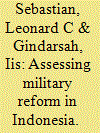

|
|
|
|
|
| Publication |
2013.
|
| Summary/Abstract |
This article seeks to assess the magnitude of military reform in Indonesia and its impact in establishing greater levels of professionalism within the armed forces. To this end, the authors will offer some reflections on the studies of civil-military relations and military transformation for inculcating a higher degree of military professionalism; analyse to what extent the process of military reform in Indonesia has reshaped the institutional role of the armed forces; and discern three major strategic gaps in Indonesia's military reform, namely the "legal loopholes and regulation vacuum," the "shortcomings of democratic civilian control," and the "defence-economic gap." This article asserts that military professionalism will grow more substantially depending on the ability of civilian elites to exercise effective control over the military and the capacity of the government to transform the military establishment keeping pace with strategic challenges and operational requirements.
|
|
|
|
|
|
|
|
|
|
|
|
|
|
|
|
| 2 |
ID:
124523
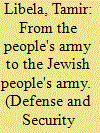

|
|
|
|
|
| Publication |
2013.
|
| Summary/Abstract |
The article discusses processes of “religionization” within the institutional identity and ethos of the Israel Defense Forces (IDF) and the connection of these processes with the significant structural changes the IDF has undergone in recent decades. The main argument presented is that since the late 1980s, the IDF has been in a culture conflict, torn between soldiers and civilians who advocate turning the IDF into a professional army “military professionalization,” and others who wish to preserve, and even strengthen, the “people's army” model. The present article shows that the meaning of the term “people” in this phrase has shifted to refer strictly to the Jewish people, and that a national-ethnic perception strongly influenced by religious-national ideology has been adopted.
|
|
|
|
|
|
|
|
|
|
|
|
|
|
|
|
| 3 |
ID:
124527
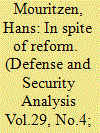

|
|
|
|
|
| Publication |
2013.
|
| Summary/Abstract |
Security Intergovernmental Organizations, here illustrated by NATO, persist in a "permitted interval" of internationalization, i.e. permitted by its member-states. On the one hand, they are seldom or never permitted to vanish due to member-states' vested interests in retaining them as tools of statecraft, even if their original purposes have become redundant. On the other hand, there is an internationalization ceiling that they must respect: they should not become too autonomous and thereby no longer be suitable as member-state tools. In spite of post-Cold War reform, interviews carried out at NATO Headquarters (HQ) in the late 1980s compared to interviews in 2012 display that a continuous pulling and hauling of forces of internationalization and renationalization have taken place around NATO HQ. The only instance of clear internationalization can be observed in the proactive diplomacy of Secretary General Fogh Rasmussen. There is stiff opposition to the internationalization of abolishing the Military Committee/International Military Staff among minor and South European states, and there is no waning in states' attempts to micro-manage the International Staff. Only external shocks can overcome resistance to internationalizing reform.
|
|
|
|
|
|
|
|
|
|
|
|
|
|
|
|
| 4 |
ID:
124522


|
|
|
|
|
| Publication |
2013.
|
| Summary/Abstract |
States confronting cross-border intrusions of terrorism, illegal immigration, and/or drug trafficking weigh the costs of such intrusions against the costs of imposing barriers to prevent or curb the intrusions. In such situations, the degree of national security afforded a state depends, in large measure, upon the degree of border openness the state chooses. Depending upon the intensity and frequency of the intrusions - expressed in terms of opportunity-cost functions - a state might have little choice but to pursue a border policy of zero openness. It is this relationship of border openness to national security that explains why many states choose to construct security fences. In the 49 cases of security fences examined, many - among them Israel vis-à-vis the West Bank, India vis-à-vis Pakistan, Turkey vis-à-vis Greece in Cyprus - the construction of security fences becomes more complicated by their placement on lands whose sovereignties are disputed.
|
|
|
|
|
|
|
|
|
|
|
|
|
|
|
|
| 5 |
ID:
124525
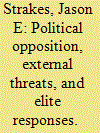

|
|
|
|
|
| Publication |
2013.
|
| Summary/Abstract |
In the years since the 2003 Rose Revolution, the popularly elected leadership of the Republic of Georgia has responded to organized protests with a variety of repressive tactics. These reactions suggest that former challengers to authoritarian elites may utilize similar methods of retaining power during crisis periods. Yet, the alleged involvement of agencies of the Russian Federation in fomenting domestic instability has also occupied a central position in the national security policies of the outgoing Saakashvili government. These conditions both preceded and were reinforced by the South Ossetia War of August 2008. This article proposes a theoretical model that represents the intervening effect of interstate conflicts on state-society relations in Georgia from 2003 to present. It presents several hypotheses and possible indicators, data sources, and techniques for analyzing the interaction between characteristics of opposition groups, external threats, and the domestic security practices of contemporary Georgian political elites.
|
|
|
|
|
|
|
|
|
|
|
|
|
|
|
|
| 6 |
ID:
124526
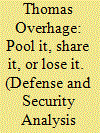

|
|
|
|
|
| Publication |
2013.
|
| Summary/Abstract |
In a general and economical view, this article analyzes methods and mechanisms for the pooling and sharing of military forces and weapons inside the European Union (EU) in times of scarcity. Pooling and sharing could improve the EU military capabilities significantly if differences in location factors were taken into account and all states would focus on their respective strengths. More competition and less concentration are the keys to ensuring guaranteed access to military assets. Pooling and sharing are likely to be successful only if large states enhance their emphasis on collective defense by mutual aid and self-help, and reduce particularistic and parochial interests of local gain. The realm of personnel has the most potential for improvement but any change is likely to generate policy implications.
|
|
|
|
|
|
|
|
|
|
|
|
|
|
|
|
| 7 |
ID:
124528
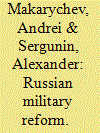

|
|
|
|
|
| Publication |
2013.
|
| Summary/Abstract |
This critical comment examines the incentives, major priorities, difficulties and first results of the Russian military reform that is being implemented since 2008. The authors conclude that despite numerous drawbacks and barriers to the reformist efforts certain successes can be identified. Particularly, there is a clear shift from the old-fashioned, Soviet-type army to a more compact, mobile, better equipped and combat-ready armed forces that are capable to cope with today's challenges to Russian national security.
|
|
|
|
|
|
|
|
|
|
|
|
|
|
|
|
|
|
|
|
|